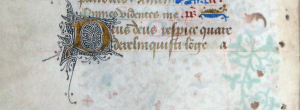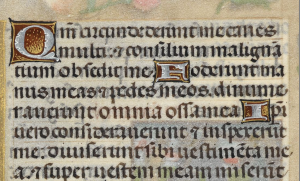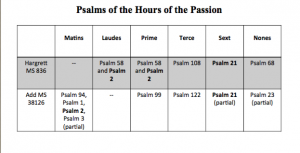There are days that I feel like Gandalf in The Fellowship of the Ring, searching, sifting through information for days with only a little to go on to begin with. But then, then comes the day when all of that information begins to come together into, well, something. Not quite a One Ring realization in my case, but a good one nonetheless. In fact, I’m not quite sure what all of this research in coming together into, but it is something interesting, something worthwhile. I have one composition book, mint green cover worn at the corners, smudged with screenprinting ink even though it’s only had roughly four months of use. It is completely filled with a messy table of contents, and a catalogue of the manuscripts I have surveyed, each entry complete with dates and locations and all of the pertinent content listings. There are drafts for a project proposal and for a blog post, random notes from meetings with Dr. Camp and conversations with Katie, and the entire transcription of the Hours of the Passion from one manuscript in addition to a thorough catalogue of all of its sections and illumination. The draft of this manuscript took form in a second notebook, pliant navy cover already a little bent from being carried from England to Georgia. I imagine that this will not be my last notebook for this project.
All of these surveyed manuscripts, along with those Katie has gone through are being looked through in more depth to pull from the relevant bits we’ve already identified. I’m looking solely at the versions of the Hours of the Passion that we’ve found, a total of only about 25 occurrences out of roughly 180 manuscripts surveyed. Besides these manuscripts, there were several items that contained The Psalms of the Passion, but not the actual Long Hours; I’m not entirely sure how relevant those texts might be, but I suppose that once I look at each version of the Hours of the Passion, I might see if these odd little instances hold any weight in my research.
Overall, I’m looking forward to the results of the analyses of these texts, and am surprisingly not intimidated by the daunting prospect of trying to do a selective textual comparison of 25 different manuscripts. I’ll admit that it’s because I’ve had a, well, practice run, I suppose, a smaller test at comparing texts and drawing conclusions from the results. This was the 4’33” Spotlight on Scholarship in the Arts poster competition. I picked one of the manuscripts that I had surveyed and found had contained a large amount of Passion related material in addition to the Hours of the Passion, British Library Add MS 38126, also called the Huth Hours. I then proceeded to transcribe the entirety of this manuscript’s Hours of the Passion, keeping track of the resources I found that matched pieces from the text on a Google doc, as well as marking up the transcription where it matched anything from the Hargrett Hours Passion sequence.
I don’t plan on going as in depth with the comparisons in this big picture analysis because the poster project pointed me towards the Psalms and the hymns contained in each hour as a potential measure of continuity or standardization of the Long Hours of the Passion. Between the Huth and Hargrett Hours, those two parts of the texts are the ones that held the largest similarities. Was it possible that despite a lack of apparent standardization, the Psalms and hymns (essentially the meat of the hours) were the most likely to stay semi-consistent between manuscripts, while versicles, responses, and antiphons were more mutable, more easily changed from book to book based on the region, time, heck, even the scribe’s or owner’s decisions? After all, when I read through each Gospel’s account of the Passion in my study Bible, there are footnotes referencing a number of related Psalms, some even spoken in part by Christ during his crucifixion. Surely the Psalms understood as related to the Passion might have been similar in the medieval era, and if so, then at the very least, I would like to imagine that there should some consistency in Psalms used in the Long Hours of the Passion.

One example includes Psalm 21 (22 in modern Bibles), which opens with “Deus Deus meus respice me quare me dereliquisti,” which in English is “O God my God, look upon me: why hast thou forsaken me?” These are the words Christ cries out in Matthew 27:46 during his last moments on the cross. This Psalm appeared in both the Hargrett Hours and in the Huth Hours.I anticipate that this Psalm will appear more because of how closely related it is to the crucifixion of Christ. To be honest, why would it not appear?

On the other hand, I imagine that hymns might give me a little more trouble in finding consistency between manuscripts. To be fair, I’m basing this on the sheer number of hymns in existence today, but during the course last semester, we saw a very large number of them in multiple manuscripts. Without further research, I would assume that the medieval era had a similar abundance in hymns, and that given the Latin nature of many of the texts, they would easily be used in various places and times. Additionally, given that between the Hargrett and Huth Hours, there were four common hymns in the Offices of the Passion, I do hope that these similarities might prove more than a one-time thing.
Like in my poster project, I’m going to record the text of the Psalms and hymns, and then chart them to look for common

selections. One chart will contain the Psalms of each hour for each manuscript, while another will perform the same function for the hymns. Two other charts will display the comparison of the Psalms and hymns that are found to be common between at least two manuscripts, with the texts that match completely bolded. This will create a visual of the data, which I hope will help provide a clearer image of any patterns or larger similarities that might point towards standardization.
So far, things look promising. I’ve found several more Psalms that match the ones in the Huth hours, so perhaps I may find that there are common selections in the Office of the Passion after all. Right now, though, I haven’t quite had my One Ring realization, just some smaller ones that might point me towards that final conclusion in the end. Whatever may come, however long it may take, the process is an adventure of its own.
Madison
Resources
The Bible. New International Version, Zondervan, 2011.
Latin Vulgate.com. http://www.latinvulgate.com.